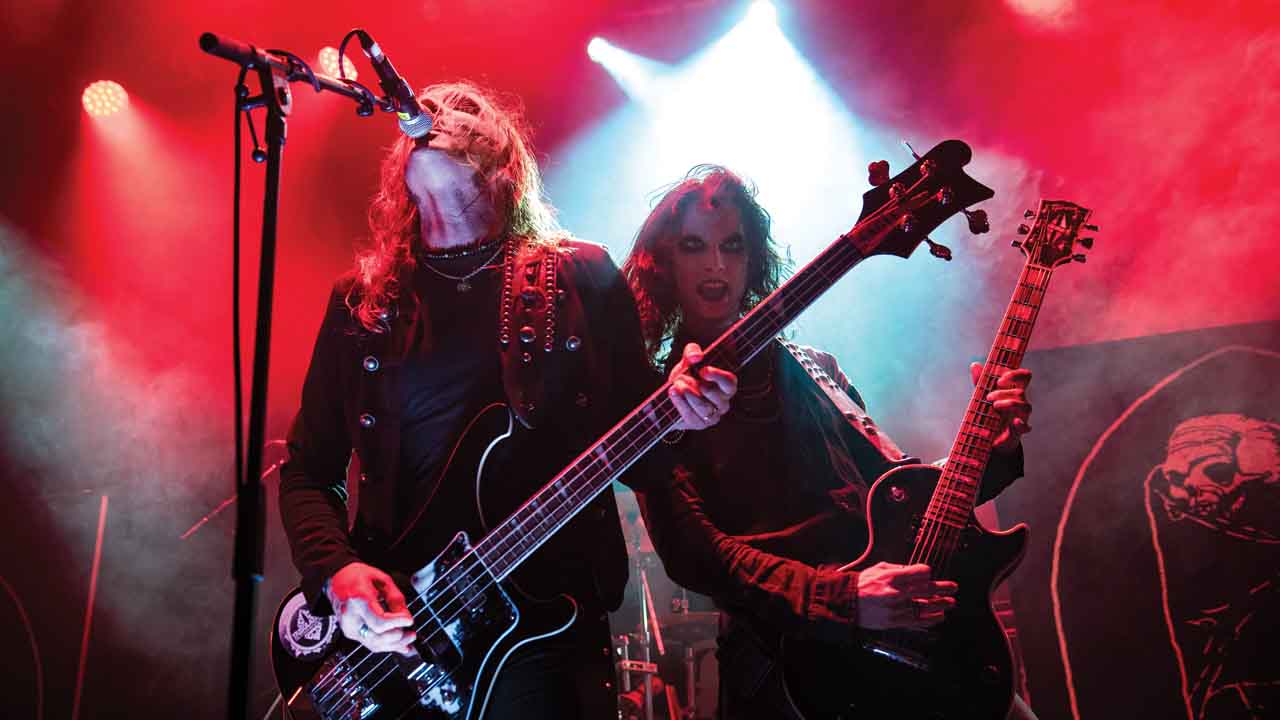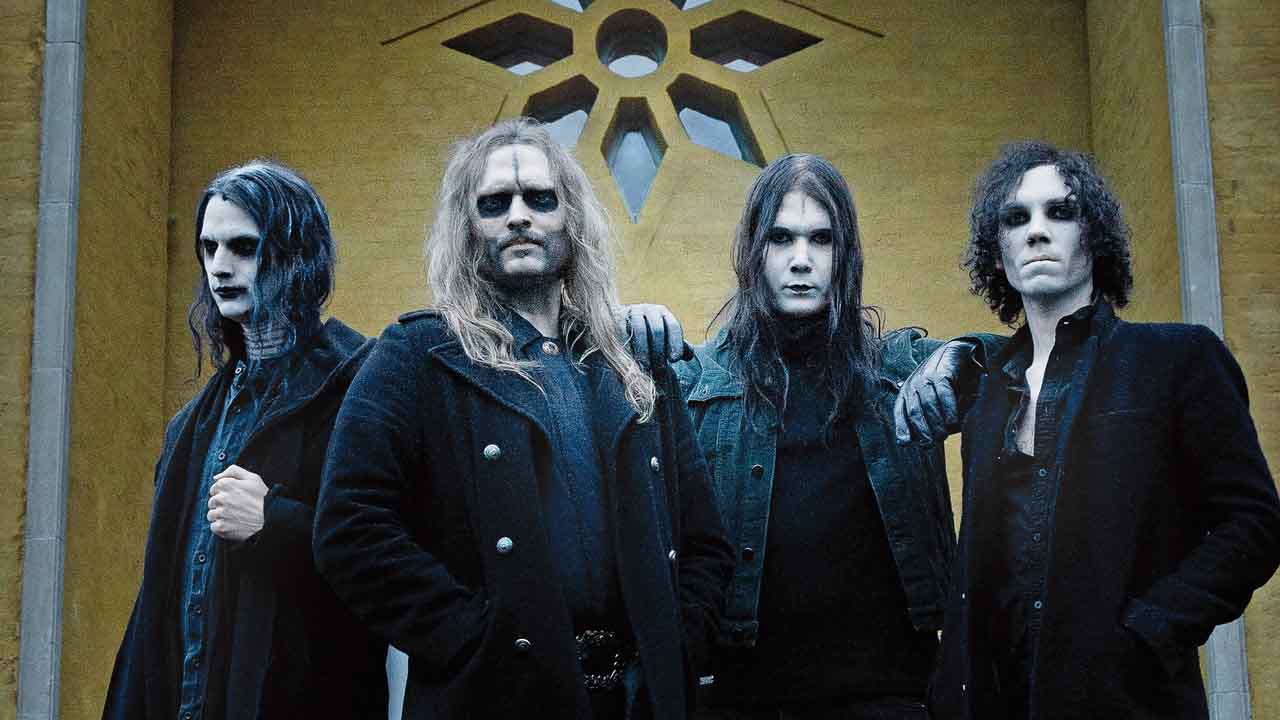Tribulation frontman Johannes Andersson was at his friend Joseph Tholl’s place. They were a few beers too deep and it was getting late, but nervous juju crackled through the air. Johannes knew what he had to do: he popped the question.
“I didn’t want to be drunk… but I was. He kinda sensed what was going on, I guess, then it all just blurted out.”
If someone goes solo, in the history of bands… that’s usually not good, right?
Johannes Andersson
Johannes didn’t ask Joseph to marry him. He asked him to join Tribulation. The band - with Johannes on bass and screaming like a dehydrated corpse, alongside guitarists Adam Zaars and Jonathan Hultén – formed in 2004, spending 10 years crawling from Sweden’s death metal underground until they got their dirt-flecked fingernails inside the Sony-owned label, Century Media. A switch from brutalism to lush, intrepid goth came with 2015’s The Children Of The Night, and during the cycle for their fourth record, 2018’s Down Below, they secured arena support slots with Ghost and, perhaps more head-scratchingly, a Moscow stadium show with Five Finger Death Punch.
“I actually watched from the side one night, and I scratched my head as well,” Johannes jokes. “They were our first-ever shows in Russia, so it was a no-brainer to take the deal and play in front of a lot of people instead of a small club. That’s always been the mission with Tribulation: make the live show bigger.”
With more eyes on them than ever, a fifth album locked in the coffin and a tour scheduled for early 2021 (now postponed, obviously), the future looked bright for Tribulation. And then Jonathan Hultén quit.
“Honestly, it didn’t come as a surprise,” admits Johannes. “I had my suspicions. It was just very odd timing - maybe early October [months after their new record, Where The Gloom Becomes Sound, was completed]. It was actually on a Skype meeting. We were talking about a lot of business, a lot of stress, then he just said, ‘I’m, um, I’m leaving.’ I don’t blame him, either. I think he just felt he was pushed over the edge and finally said it.”
What Johannes means is Jonathan was doing the splits as he tried to straddle two very different horses. The first being Tribulation, whose Morbid Angel-inspired nastiness has since evolved into a melancholy, metal-tinged goth rock explosion of anthems that truly sounds like nothing else, and the second being his Nick Drake-inspired solo venture, which took off last year following the release of his debut full-length, Chants From Another Place.
“If someone goes solo, in the history of bands… that’s usually not good, right?” Johannes admits. “For the last year, something’s been growing in him to finalise this decision. I’d noticed he’s been zooming out more than usual. [It got to] the point where he valued Tribulation and the solo project equally.

“He loves Tribulation and he loves us, but he got fed up, I guess,” he continues. “Being in a band of our size, the business side slowly smothers you, and he’s a true artist. He needs to create, not answer a million emails or take care of finances. There’s no bad blood between us and Jonathan - he has to do whatever makes him happy. My friend Jonathan comes before my bandmate Jonathan.”
Given Mr. Hultén was one of the band’s primary songwriters and sculpted the majority of Tribulation’s new - and most accomplished - album, this decision should have been crippling. They’d been in bands together since they were actual children, and on the verge of their magnum opus being birthed, the chief songwriter had thrown in the towel.
Enter Joseph. He’d played alongside Adam and Jonathan in their pre-Tribulation outfit, Hazard, in the early 00s. In the mid-to-late 00s, he worked with Adam again in speed metal band Enforcer. In other words, he’s grown with them.
- Tribulation: Dawn Of The Dread
- 10 essential goth metal albums
- Why HIM's Love Metal is the greatest goth album of the 21st century
- The Story Behind The Song: Forever Failure by Paradise Lost
“He’s probably my oldest friend,” explains Johannes. “Our parents are best friends, as well. We grew up as toddlers, went to the same schools and discovered all the good bands together. He’s always been on the sidelines of Tribulation - everything from selling our merchandise, to driving us, to pitching in with a riff that ends up on a song. He’s been a helping hand for as long as I can remember.
“The second thing Jonathan said after ‘I’m leaving’ was, ‘You should really ask Joseph,’” he elaborates. “That’s why it’s so comforting. Because of Joseph. If he’d said no, then we’d really need space to think and regroup. It would suck so hard if we had to have auditions and invite 20-year-olds into our rehearsal space.”
Instead, Tribulation’s drummer, Oscar Leander, gave the game away with a not-too-subtle phone call while Johannes and Joseph were drinking together. “I really wanted to do it the serious way, but he’s such a good friend, it doesn’t matter. He’s our guy.”
Global pandemic permitting, Tribulation will be on the road this autumn, and new music might be closer than expected - Johannes hopes to get an EP done and dusted with Joseph, flexing his creative muscle and proving the band are far from dead before record number six. “I’ve been trying to squeeze out some songs over the past year - it just happened that [Adam and Jonathan] wrote the best ones!” he says. “With the new Tribulation, one of the changes is gonna be to try to have a more open writing landscape. I mean, we could have that in the old Tribulation, but somehow we ended up using one recipe for the last three albums. I have no worries whatsoever, though, ’cause Joseph is a genius - just as Jonathan was.”
From there, the world belongs to Tribulation. They’ve delivered five albums of absolute gold, and Down Below smacked away Ghost and At The Gates to take home the Swedish Grammy Award equivalent, the Grammis. As bands like Unto Others (formerly Idle Hands) gain steam, coupled with Gaahls Wyrd and Secrets Of The Moon magpie-ing 80s influences in recent years, it appears Johannes’ weird little death metal band ended up taking the torch from In Solitude and igniting an underground goth rock revival.
Where The Gloom Becomes Sound pours gasoline on that fire. From the stomping opener In Remembrance, all slick soloing with a shout-along chorus Tobias Forge would kill for, to the militaristic finale of The Wilderness, balancing an Immortal-esque epic scope with ghastly storytelling and spooky-dooky organs, this is not four blokes playing dress-up. This is Tribulation at the peak of their powers.
“What we’re doing is gothic music,” Jonathan affirms. “It’s becoming stronger with each album, and it’s always featured the same kind of mystical, magical themes… but back with our first demos, it was mixed with, y’know, gutting people and being extreme! Now, we have a more unique sound than the early 90s or late 80s - what goth was back then. When I’m old and playing BingoLotto [a gloriously cheesy bingo TV show in Sweden], it’d be nice to be remembered as some kind of starter of a new subgenre, I guess. If people think of that genre, they should think of Tribulation. Like when you instantly think of Slayer or Kreator when someone says ‘thrash metal’.”
Ninety-nine per cent of bands coming out with that sort of chest-puffing remark would sound deluded, but Johannes has the goods to back it up. Just as their music has slithered from extremity to wine-sipping elegance, and their thematic influences have morphed from Cannibal Holocaust to the monochrome, existential dread of Swedish filmmaker Ingmar Bergman, Tribulation have never stood still and they aren’t going to start now. In 2021, Where The Gloom Becomes Sound is the benchmark for gothic music.
Published in Metal Hammer #345

